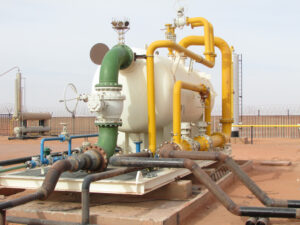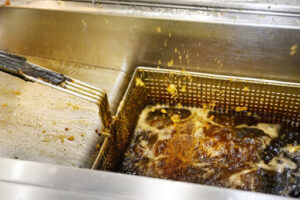Sewer backups are one of those household problems that can stop everything in its tracks. They’re messy, stressful, and bring more than just a bad odor into your home — they can lead to serious damage and health concerns. Whether it’s water pooling around your floor drain or the basement carpet getting soaked with contaminated water, the effects are frustrating and sometimes costly.
Understanding what causes sewer backups and how to prevent them can save you time, money, and a lot of stress. We’ll break down the most common causes of sewer backups and offer practical tips on how to stop sewage from backing up into your home.
What Causes Sewer Backups?
Understanding what causes sewer backups is the first step to stopping them. Here are some of the most common culprits behind a system that won’t drain right.
Grease, Oil, and Food Waste
Pouring grease or cooking oil down the kitchen sink might seem harmless, but over time, it sticks to the inside of your pipes like glue. This sticky mess grabs hold of other debris, leading to clogs that are hard to clear. Add food scraps and fibrous waste into the mix — especially items like coffee grounds or starchy leftovers — and you’ve got a recipe for a nasty backup.
Tree Roots Infiltrating Pipes
If you have trees in your yard, their roots could be hunting down water sources underground — and that often means your sewer line. Root intrusion is a common cause of sewer backups, especially in older neighborhoods with clay or cast iron pipes. Over time, these roots break into the lines and slow or block the flow of wastewater.
Flushing the Wrong Items
Toilet paper is designed to break down in water, but paper towels, feminine hygiene products, and so-called “flushable” wipes don’t dissolve easily. These items can build up in your sanitary sewer system, causing a clog that’s tough to reach without professional help.
Broken or Collapsed Pipes
Aging pipes can corrode, crack, or collapse over time, especially if they’re made from materials like cast iron or clay. If this happens, wastewater can’t flow properly, causing backups to appear in your home’s lowest plumbing fixture — usually a basement floor drain or shower.
Heavy Rainfall and Flooding
Heavy rain can overload combined sewer systems. If there’s too much stormwater flooding into the pipes, there’s a risk of backflow that pushes raw sewage into your home. Without a proper backflow valve, you might experience wastewater backing up through toilets, sinks, and even your HVAC drain line.
Signs of a Sewer Backup
Now that you’re aware of the most common causes of sewer backups, you might be asking how to spot one in action. Here are some telltale signs that you might be dealing with a sewer backup:
- Slow Drains Throughout the House: If multiple fixtures are draining slowly, it’s likely more than just a simple clog.
- Foul Odors: A strong, sewage-like smell coming from drains, the basement, or around plumbing fixtures is a major red flag.
- Gurgling Sounds: Bubbling or gurgling noises from toilets or sinks usually mean there’s trapped air from a blockage in the line.
- Water Backing Up in Strange Places: Flushing the toilet and seeing the water rise in your bathtub or shower drain is a classic sign of a sewer line issue.
- Standing Water Around Floor Drains: Pooled water around basement floor drains often means the system is overwhelmed.
- Unexplained Lush Patches in the Yard: A broken sewer line under your lawn can create unusually green or soggy spots.
- Frequent Toilet or Drain Clogs: If clogs keep happening even after cleaning, the problem could be deeper in the sewer line.
If you notice one or more of these signs, it’s time to call in a professional before the situation gets worse.
How to Prevent Sewer Backups
The good news is, you’re not helpless. Here’s how to prevent sewer backups and keep your plumbing running smoothly.
Be Smart About What You Flush
Only human waste and toilet paper should go into the toilet. Toss paper towels, feminine products, and anything else into the trash — even those wipes that claim to be “flushable.”
Keep Grease Out of the Sink
Instead of pouring grease down the drain, let it cool in a can or container and throw it away. The same goes for cooking oil, fat, and anything that hardens as it cools.
Get Regular Sewer Cleaning
Scheduling regular sewer cleaning is a key step in preventing sewer problems. Professionals like A&J Sewer Service use specialized tools to clear out buildup and spot early warning signs before they become big problems. Get in touch with us today to book your sewer cleaning in Chicago.
Install a Backflow Valve
If your home doesn’t already have one, a backflow prevention valve is worth looking into. It’s designed to stop wastewater from flowing the wrong way — especially helpful during storms or sudden floods.
Check for Tree Root Issues
An inspection can reveal whether nearby trees are starting to creep into your sewer line. If they are, a sewer rodding service might be needed to clear things out and keep the line open.
How to Stop Sewage From Backing Up in an Emergency
In case a backup happens anyway, here’s how to stop sewage from backing up fast:
- Shut off water to the house to keep from adding to the overflow.
- Avoid using plumbing fixtures, including your sink, shower, and toilet.
- Call a professional team, like A&J Sewer Service, who has the experience and tools to locate the problem and fix it quickly.
- Move furniture, carpet, and belongings out of harm’s way if water is spreading.
- Don’t touch contaminated water — it can carry bacteria, viruses like hepatitis A, and other hazards.
If you catch the problem early, it’s often possible to prevent long-term water damage or mold issues. That’s why knowing the warning signs and reacting quickly is so important.
The Bottom Line
Sewer backups are messy, expensive, and downright frustrating. But with some awareness and preventative steps, you can keep them at bay. By knowing what causes sewer backups and how to stop sewage from backing up, you’re already one step ahead.
The most common causes of sewer backups include grease buildup, invasive tree roots, flushing the wrong items, and heavy rain overloading the system. When you’re aware of the risks and are willing to learn how to prevent sewer backups, you can save yourself from an unpleasant cleanup.
Let A&J Sewer Service Help You Protect Your Home!
If you’re still wondering how to stop sewage from backing up or you’re dealing with frequent clogs, A&J Sewer Service is ready to help. With decades of experience and a solid reputation throughout the Chicagoland area, we’ve seen just about everything, including grease clogs, root intrusions, and pipe corrosion.
Our team uses the right tools for the job and brings the know-how that only comes with time in the field. We get that no two homes are alike, which is why we don’t take a one-size-fits-all approach. From simple inspections to full-service cleanouts, our services are tailored to what your system actually needs. Contact us today to schedule your appointment!



